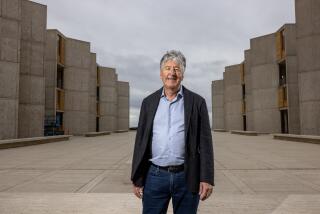Inaugural Symposium at Irvine Center : Sciences Academy Tests West Coast ‘Lab’
- Share via
The issues included the pros and cons of mapping human genes, the need for compassionate treatment of research animals as well as ethical questions involving organ transplants.
Among the 180 participants at the conference Monday and Tuesday at UC Irvine were scholars from Harvard, Stanford and Yale universities, officials from about 20 biomedical firms and at least two Roman Catholic priests.
For the record:
12:00 a.m. May 26, 1988 For the Record
Los Angeles Times Thursday May 26, 1988 Orange County Edition Metro Part 2 Page 2 Column 5 Metro Desk 2 inches; 37 words Type of Material: Correction
The location of the new Arnold and Mabel Beckman Center of the National Academies of Sciences and Engineering was given incorrectly in a story Wednesday. The center, which is not affiliated with UC Irvine, is located across the street from the university campus.
It was the first symposium held by the National Academy of Sciences at its new West Coast conference center--the Arnold and Mabel Beckman Center of the National Academies of Sciences and Engineering, which was dedicated April 17.
The organizer of this two-day symposium on “biological research and human values” is a 54-year-old former priest-turned-geneticist, Prof. Francisco J. Ayala of UCI.
In an interview between seminars Tuesday, Ayala said the symposium was, in part, an effort to introduce Orange County residents to the prestigious academy, based in Washington, which has served for 125 years as scientific adviser to the federal government.
“We want people to know about scientific reasoning,” Ayala said. “Also, we want them to think about scientific applications--public policy issues--so we’ve invited philosophers and ethicists, citizens and even the press. We’re trying to get them to participate so we can learn from them.”
(Although the symposium was not open to the public, Ayala said he hoped people would learn of it through press reports.)
Ayala, who joined the UCI faculty in September as a distinguished professor of ecology and evolutionary biology after 16 years of teaching at UC Davis, is no stranger to ethical issues involving science.
In his 24-year academic career, he has frequently battled “creationists” who dispute Darwin’s theory of evolution and take a literal view of the Bible, contending that God created the Earth and all of its life in six days.
Last year, Ayala won the Scientific Freedom and Responsibility Award from the American Assn. for the Advancement of Science for his outspoken support of evolutionary theory, his concern with ethics and for teaching that the creationist movement is a threat to scientific education.
In 1981, he was one of five scientists who testified in a landmark case contesting an Arkansas law requiring that creation science be required in public schools whenever the theory of evolution was taught. A federal judge upheld the argument that there was no scientific merit to creation science and ruled the state law invalid.
Recently, Ayala has been a vehement critic of a $3-billion, 20-year research project proposed by some of the nation’s top biologists to identify the 3 billion chemicals that define the “genome”--or a person’s genetic makeup.
Ayala has questioned whether identifying the sequence of the genome will tell scientists any more about human development and disease than would be available through simpler, less expensive methods. Those could include mapping about 100,000 DNA (deoxyribonucleic acid) fragments in a human’s genetic makeup rather that attempting the tedious process of identifying and charting the billions of chemicals in each fragment of DNA.
In introductory remarks at the symposium Monday, Ayala mentioned the debate over the genome. “The body politic is watching as biologists promise to produce new wonder crops or to fashion the genes that cause disease . . . into healthy ones, and as demands are made for hundreds of millions of dollars for a single enterprise such as mapping and sequencing of the human genome,” he said.
Ordained a Catholic priest in 1961 in Madrid, where he was born, Ayala said he left the church that year to study genetics and evolution. He left, he said, because of “my inability to understand physical evil and moral evil”; for instance, how an omnipotent God could allow a defective child to be born.






